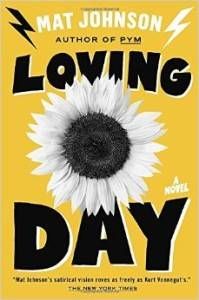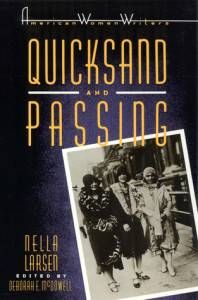
Black-ish: Passing, LOVING DAY, and Rachel Dolezal

In Mat Johnson’s latest electrifying look at race in this country, a really light-skinned biracial man stumbles upon his even lighter-skinned biracial daughter, a teen who’s believed that she’s White/Jewish her whole life, and is now coming to terms with being ‘a Black.’ Sort of. But part of the process for father and daughter is accepting that they are biracial, of two worlds, not just Black or White.
In Loving Day, there’s a few derogatory names for folks who favor one side of their racial heritage over the other (Sunflower: light skinned on the outside, brown in the middle, Oreo: black skinned, “act” White), and a school devoted to learning to accept all your sides (Mélange) and a handy questionnaire which will determine if you’ve been leaning too far to one side (White/Black), and a workshop on how to balance yourself between the two worlds.
It’s not a book that shies away from the bitter truths of the internalized racism we’re just carrying around like monkeys on our collective backs. Johnson forces you to look at yourself, recognize how you’re part of the problem, before crying foul on other people’s issues. All this in a really entertaining book, by the way. It’s not all black and white.
***
It took a long time for me to accept myself exactly as I am. I am Black/African American/Afro American/of the African Diaspora, but, with my light skin and eyes, it’s still something I instinctively want to prove. Like right now, I feel the need to tell you that both my parents are Black. Defined as: all of their parents were Black. And here I am.
But my mother is also from Louisiana, which gave her some Creole, defined as having French colonial heritage; and she has Jewish greats back in the family line; and her grandmother was Native American. But both of her parents identified, in the deep south, during darkest segregation, as Black. And were treated as such. So my mom high tailed it out of there after college and came to California, met my Black dad. And here I am.
But here’s the thing: my Blackness is questioned all the time. Questioned by non Black folks who hear me on the phone, my work voice in full effect, and assume, from my elocution and tone, that I must be white. I know this because they’ll say to me, once they meet me in person, “Oh! I didn’t realize you were Black! You sound so….”
Questioned by Black folks, called an Oreo by those who assume my high yellow (my preferred slang for my skin color, and a moniker I’ve actually come to love, thanks in huge part to my beautifully mulatto half-n-half wife) ass is mixed/biracial/mulatto. Because I’m too light skinned to be Black. Because I don’t sound Black. Because I don’t act Black enough.
I recently put together a LibGuide on books for and about young black girls. Because I needed it. Because even though I still smart from having my Blackness questioned, I’m guilty of doing it to others. Making skin-colored jokes. Making assumptions.
I wade through all of this to get to a point, and it’s about Rachel Dolezal, the Spokane, Washington NAACP leader who resigned her position after being outed as White, not Black. It’s about Loving Day. It’s about our fucked up understanding of race.
***
I feel for Rachel Dolezal. I really do.

But there is the other side. Folks who take on the popular image of Black culture—speech, dress, hair, music—to be down, to obtain that lofty thing known as street cred, to fit in with the people around them.
From what I can tell, Dolezal meant no harm by calling herself Black. She taught Black history, fought for Black rights, loved Blackness in all its glory.
My biracial wife, half island Black, half heartland White, passes all the time. Not intentionally, not for any sort of purpose or gain, but simply because people look at her, take what they know of Black and White: take in her hair, skin color, tone of voice, and pick one. It’s a truly amazing thing to see in split-second action. When she cornrowed up her hair, there was no question: Black. And she’d be treated like just another Black man in America. (You should also know she’s hirsute, has facial hair, aligns more with the butch side of the lesbian spectrum.) When the hair is in happy nappy twists, or short and sweet, there’s a hesitation: maybe she’s White, let’s react as if that’s true and see what happens.
We look at someone and decide their racial affiliation based on some stereotypical cues that we’ve all believed in for hundreds of years. Black folks do this, look like that, talk like this, eat this food, listen to that music, dress like this, be like that. In a world where this simplistic way of thinking is the acceptable norm, maybe one day Dolezal, who might’ve had a summer tan, whose hair might have frizzed out, who definitely studied African Americana and could eloquently speak to the Black struggle—maybe one day she just went with it, and never looked back. Reinvented herself. Passed.
It’s not a big leap, and she probably didn’t have to convince a lot of people. With her educational credentials, and this world, who would question someone’s assumed blackness? (And if you did question it, what kind of pc hell would you be in if you’re wrong?)
***
As I write this, the United States is celebrating a different kind of loving day, watching marriage equality spread like a glorious, happy rainbow. Rainbow flags flying, confederate flags coming down.
Loving Day is an exaggerated example of the conversation we need continue having right now. Who defines race? When your parents are two different colors, which side do you chose, and why are you made to pick? Who tells us what we are and how to be? In today’s multicultural biracial world, why is this still an issue?













